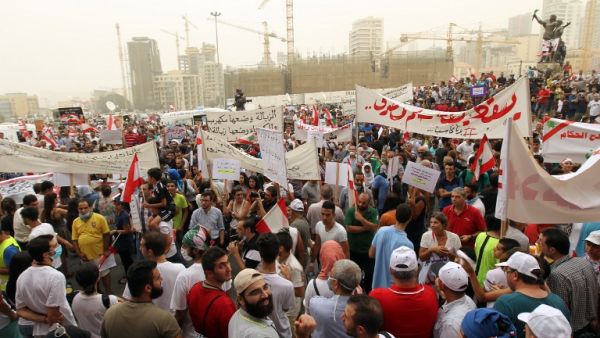The Cabinet agreed Wednesday on a comprehensive plan to unwind a ruinous and protracted national trash crisis and put the country on the path toward sustainable waste management.
After nearly two months of disputes, the ministers resolved to reopen the Naameh and Burj Hammoud landfills to relieve most beleaguered Beirut and Mount Lebanon residents of the trash that accumulated first on their streets, and then in their rivers and valleys.
They also agreed to begin distributing trash to a dump in Akkar and another in the eastern Bekaa Valley, and to the Sidon waste treatment plant. The Council of Development and Reconstruction is to draw up a plan within a month to develop the two dumps into sanitary landfills, Agricultural Minister Akram Chehayeb said after a marathon special Cabinet session.
Chehayeb, who presented the Cabinet with the plan, vowed that Naameh would open for just seven days, to receive the trash that has accumulated around Beirut and Mount Lebanon since it last closed, on July 17. He did not say when this period would begin.
The other sites are to stay online for 18 months, until municipalities are prepared to manage their own waste affairs. They will be supported by state finances as well as state and international advisers, Chehayeb said, adding that the Burj Hammoud landfill would only be reopened once the existing mountain of garbage there is removed.
The Cabinet agreed to renew portions of Sukleen’s contract for the interim period, to have the company sweep streets and collect municipal garbage. He did not say which firms would manage the landfills.
These provisional solutions are sure to draw resistance from segments of civil society, namely from residents near the sites concerned.
But the plan’s long-term strategy appears to meet many civil society demands. These include supporting robust waste recycling initiatives, returning management responsibilities to municipalities and transferring hundreds of millions of Lebanese pounds to municipal accounts.
“The Cabinet approved decrees proposed by the interior and finance ministers to give municipalities and municipal unions their share of state telecommunications revenues, without any cuts,” Chehayeb said. The ministers also agreed to release funds from the Independent Municipality Fund, the state’s pot of money for the municipalities.
It was immediately clear that the proposal to reopen the Naameh landfill would meet stiff resistance.
Environment Minister Mohammad Machnouk had retired the landfill in July, after it had been many times overfilled beyond its intended capacity. Residents from surrounding towns had campaigned for years to close the fill, and they twice staged sit-ins at its gates to force the matter.
Ajwad Ayache, a Bawouerta resident and an organizer of the Close Naameh Landfill campaign, vowed to block this component of the Cabinet’s plan.
“Impossible,” he said regarding the reopening of Naameh. “There is no way. We are going to face them with all the means we’ve got. The landfill is closed and it will not open again. It’s non-negotiable.”
“We are ready to move [to the gates] within half an hour, we’ll be down there with our tents,” he told The Daily Star.
Paul Abi Rashed, a leader of a coalition of Lebanese environmentalists, said environmental organizations have voiced their support for the long-term strategy approved by the Cabinet.
“But no one discussed with us the reopening of the Naameh landfill for seven days, the establishment of two landfills and [sending garbage] to [the] Burj Hammoud [landfill],” Abi Rashed told The Daily Star.
Abi Rashed said he had to discuss the approved plan with his colleagues in environmental groups before taking a final stance.
Hezbollah and the Free Patriotic Movement each sent a minister to the Cabinet session after the two parties boycotted the previous one.
But Education Minister Elias Bou Saab from the FPM said on his way to the meeting that “the decision to show up is to demonstrate goodwill.”
Still, Foreign Minister Gebran Bassil of the FPM and State Minister Mohammad Fneish of Hezbollah did not attend.
By Philip Issa








